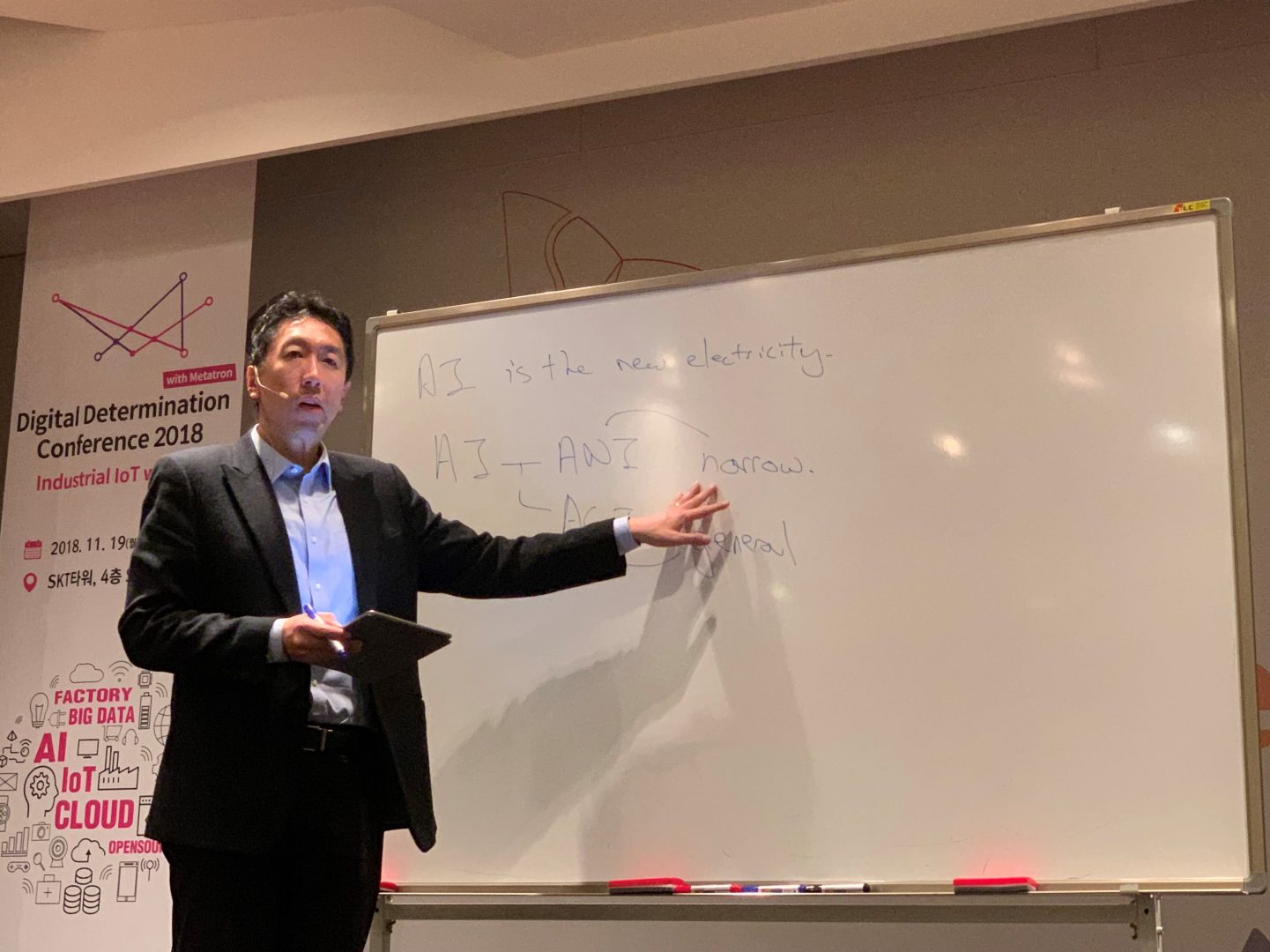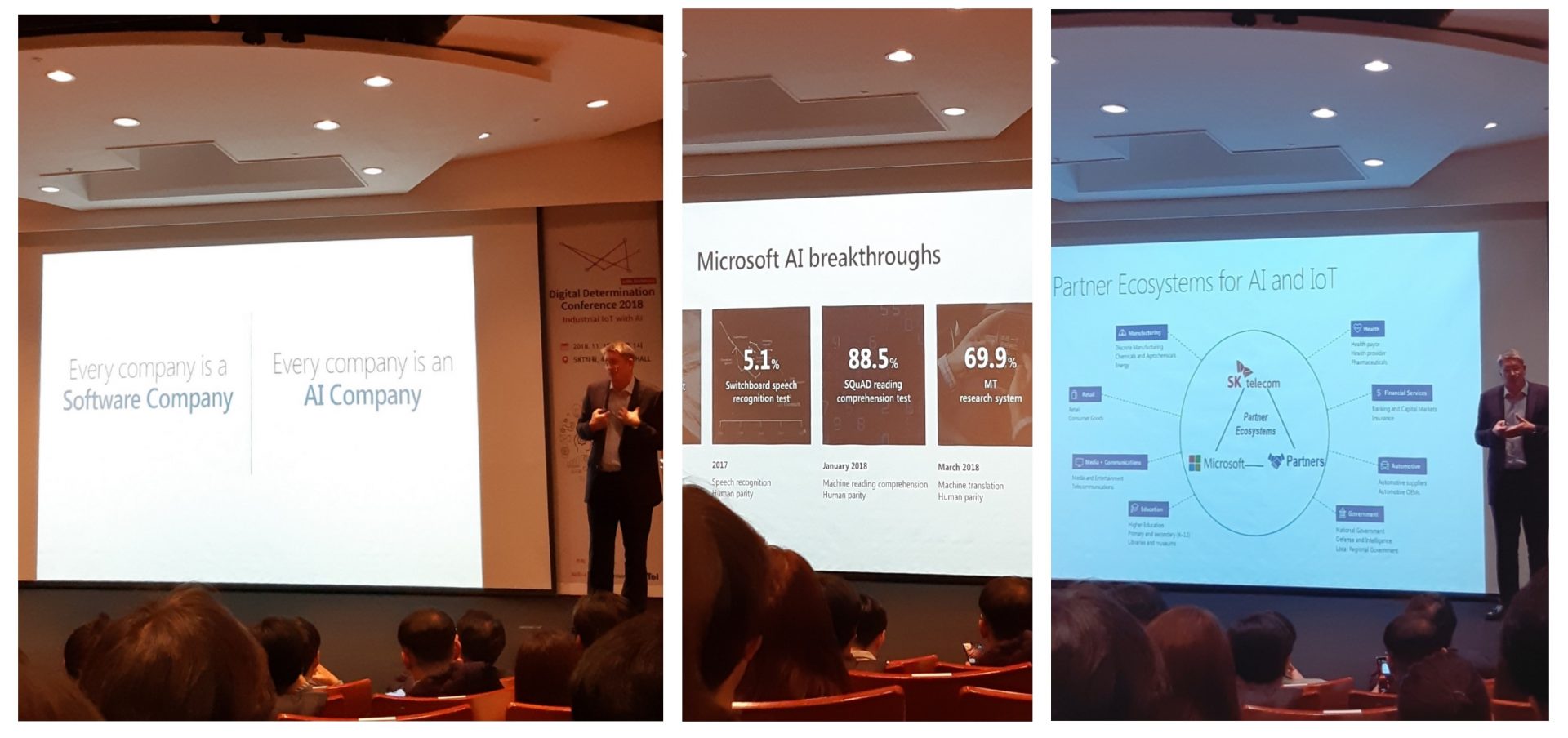Digital Determination Conf 2018 Successfully Held
Notice: Undefined offset: 1 in /data/httpd/www/html/wp-includes/media.php on line 764
Notice: Undefined offset: 1 in /data/httpd/www/html/wp-includes/media.php on line 766
Notice: Undefined offset: 1 in /data/httpd/www/html/wp-includes/media.php on line 769
Notice: Undefined offset: 1 in /data/httpd/www/html/wp-includes/media.php on line 70


A Successful Conference
Metatron’s 1st conference, the Digital Determination Conference (DDC) 2018 was successfully held on November 19th. Hosted at SUPEX Hall of SKT-tower, Seoul, it attracted over 500 participants of developers and business partners from various industries.


Our aim of the conference was to “Reveal the Power of Data & AI in Industries”. We wanted to share SK Telecom’s current AI / Cloud / Open-source capabilities and to provide a networking opportunity for participants. Along with introducing SK Telecom’s technology, we also wanted to suggest a solution to work together towards coexistence.
Three keynote speeches from three honored guests
- Andrew Ng of Landing AI
- Peter Wihman of Microsoft AI
- Moon Soo Lee of ZEPL
This year’s keynote speeches were presented by three honored guests from each field of AI / Cloud / Open-source. Much to people’s surprise, Andrew Ng, the co-founder of Coursera and an adjunct professor of Computer Science at Standford, attended our conference as the first keynote speaker. Being a former head of Baidu AI Group and Google Brain, he founded an AI company and is also leading the education in the field. For the conference, he gave a speech about “The Development of AI Bringing Transformations in Companies”.


Dr. Andrew Ng first introduced two types of AI: ANI (Artificial Narrow Intelligence) and AGI (Artificial General Intelligence). Current focus is mostly on ANI and more progress is to be made on AGI. According to Dr. Andrew Ng, the four key points of AI company is
1) Strategic data acquisition, 2) Unified data warehouses,
3) Pervasive automation, and 4) New job descriptions.
He told the audience that AI is not about automating ‘jobs’ but about automating ‘tasks’. Closing the speech, he suggested five steps to make a great AI company:
1) Pilot projects to gain momentum, 2) Build an internal AI team,
3) Provide broad training, 4) Work on AI strategy, and 5) Active communications.


Peter Wihman of Microsoft Asia, attended our conference as the second keynote speaker with a topic “Democratizing AI”. His speech covered AI with Cloud and Edge computing. Being an AI strategy lead, he is constantly working towards active digital transformation era where everyone is able to benefit from AI technology. Based on this idea, Microsoft Azure supports an integrated AI platform which provides AI infrastructure, service and toolkit altogether. He emphasized that nowadays,
every company is a software company and also an AI company.
Closing the speech, he suggested an AI and IoT partner ecosystems of SK Telecom and Microsoft for sectors such as health, financial services, automotive, government, education, media, retail, and manufacturing.


Third and last keynote speech for Open-source field was presented by Moon Soo Lee, the co-founder and CTO (Chief Technology Officer) of ZEPL. Apache Zeppelin started here. Zeppelin is a web-based interactive notebook used for data analytics and is one of the most famous open-source project world-wide, with more than 260 contributors. His topic was “The Ecosystem of Global Open-source Project”. He emphasized that ecosystem based development is compulsory to be influential enough in the industry. An ecosystem of an open-source project consists of developers, users, companies and other projects or open-source foundations. He suggested that mutual contribution and integration of third party projects brings maturity of an open-source project. He closed his speech with a phrase “Community over code”, reinforcing that
constructing an ecosystem is equally important as the program development.
Booths


During the break of the conference, attendees had an opportunity to network with other participants and to look around booths organized by metatron discovery, Microsoft Azure and BISTel. At the booths, developers and representatives of each service answered questions from participants and demonstrated trials for their services.


Second session: Data Solutions in Industries


Second session consisted of four actual case stories carried out in industries by SK Telecom and BISTel. First was open-sourcing our metatron discovery. From Metatron Project, Jeong Ryong Lee briefly introduced metatron and our next steps regarding the ecosystem. “There are a variety of IoT platforms out in the world. However, not many analytics platforms are open-sourced. I hope this event brings more developers and partners together to participate in the ecosystem,” he said. Being a unified, open-source self-service data analytics solution, our next steps are to
1) Apply PaaS/SaaS of cloud technology, 2) Enhance development support,
3) Enhance further analytics with machine learning and AI, and 4) Build an active community.


Ji Ho Kim from Metatron Business team shared his insight on the status of Korea’s data technology industry. He presented a data maturity graph with 5 levels:
L1) Infancy, L2) Tech. Biz., L3) Biz. Analysis,
L4) Enterprise analysis, and L5) Data & Analytics aaS.
Most of the companies are still in L3, the business analysis stage, where they have infrastructure and storage for big data but stays on limited usage. Upper levels require free usage of data and implementation of cloud service. This is why we developed metatron discovery as a self-service platform, to free data access of users. We look forward to step up to level 4 with the open-source ecosystem.


Tae Hee Hong from SKT’s ICT Infra center shared why and how Data Warehouse was constructed, and how metatron was applied on the warehouse. Metatron 1.0, developed privately back then, was the very first version of metatron applied on managing CEI data of mobile communication quality. He also pointed out pros and cons of Metatron 3.0 and made suggestions on further developments.
Hyun Jin Kim from BISTel shared the vision of AI and machine learning applied in manufacturing. She pointed out five problems in the manufacturing field and suggested AI and machine learning based solutions for each problems. She also suggested a cloud-based integrated solution of SK Telecom’s metatron and BISTel. Furthermore, Seong Hwa Ahn from SKT’s Hynix Project of Data Tech center shared his story of how open-source system was implemented in analyzing Hi-tech manufacturing process.


Overall, the conference was a successful gathering of data experts from various business sectors. We hope to be able to provide more events like this to share insights and visions of data industry as a part of the ecosystem.
We all look forward to meeting again at our future conferences.

